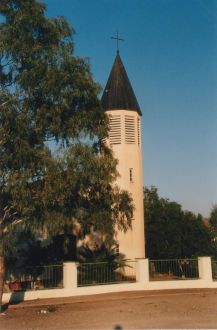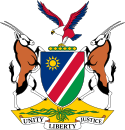
South West Africa was a territory under South African administration from 1915 to 1966, and under South African occupation from 1966 to 1990. Renamed Namibia by the United Nations in 1968, it became independent under this name on 21 March 1990.

Keetmanshoop is a town in the ǁKaras Region of southern Namibia. It is named after Johann Keetman, a German industrialist and benefactor of the city. Keetmanshoop had a population of 27,862 people in 2023.

Elections in Namibia determine who holds public political offices in the country. Namibia is a semi-presidential representative democratic republic. It runs direct elections every five years for the position of the president and seats in the National Assembly, and every six years for the Regional Councils and the distribution of seats in local authorities. The National Council is elected indirectly by the constituency councillors of Namibia's 14 regions.

The Popular Democratic Movement (PDM) is an amalgamation of political parties in Namibia, registered as one singular party for representation purposes. In coalition with the United Democratic Front, it formed the official opposition in Parliament until the parliamentary elections in 2009. The party currently holds 5 seats in the Namibian National Assembly and one seat in the Namibian National Council and has lost its status as the official opposition party, taking the fourth place. McHenry Venaani is the President of the PDM.
The United Democratic Front (UDF) is a political party in Namibia. Justus ǁGaroëb founded the party in 1989 and led it until 2013. The party president since January 2024 is Hendrik Gaobaeb. The UDF is represented in the National Assembly and the National Council. 1 regional councillor and 21 local councillors are from the UDF.

The National Unity Democratic Organisation (NUDO) is a political party in Namibia. It has been represented in the National Assembly of Namibia and in the National Council of Namibia since it split from the Democratic Turnhalle Alliance prior to the 2004 general and local elections. The party's president is Esther Muinjangue.
Dirk Frederik Mudge was a Namibian politician. He served in several high-ranking positions in the South African administration of South West Africa, was the chairman of the 1975–1977 Turnhalle Constitutional Conference, and co-founded the Republican Party (RP) of Namibia as well as the Democratic Turnhalle Alliance (DTA), now known as the Popular Democratic Movement (PDM).
Okahandja is a city of 45,159 inhabitants in Otjozondjupa Region, central Namibia, and the district capital of the Okahandja electoral constituency. It is known as the Garden Town of Namibia. It is located 70 km north of Windhoek on the B1 road. It was founded around 1800, by two local groups, the Herero and the Nama.
The South West Party was a political party in South West Africa, today Namibia. Initially the party was known as Union Party. The party was founded in Windhoek in September 1924 by F. van der Heever, A.P. Olivier, and Andries de Wet. It took the name SWP in 1926.

Berseba is a village in the ǁKaras Region of southern Namibia. It is situated near the Brukkaros Mountain, a famous tourist destination. Berseba had 992 inhabitants in 2023.

Maltahöhe is a village in southern central Namibia close to the Swartrand escarpment, about 110 km west of Mariental in the Hardap Region. It owns about 17,000 hectares of land and had 3,464 inhabitants in 2023. Maltahöhe is the administrative centre of Daweb Constituency.

The Transitional Government of National Unity (TGNU), was an interim government for South West Africa (Namibia) between June 1985 to February 1989.

The Turnhalle Constitutional Conference was a conference held in Windhoek between 1975 and 1977, tasked with the development of a constitution for a self-governed South West Africa (Namibia) under South African control. Sponsored by the South African government, the Turnhalle Conference laid the framework for the government of South West Africa from 1977 to independence in 1989.
The Federal Convention of Namibia (FCN) was a political party based in Rehoboth, Namibia. It was created in the wake of Namibian independence in 1988 by a merger of several smaller parties and gained a seat in the Namibian Constituent Assembly. After also-ran results in 1994 and 1999 it ceased to be publicly active.
The Workers Revolutionary Party is a communist party in Namibia led by Attie Beukes and Harry Boesak.
The National Patriotic Front is a political party in Namibia.

Parliamentary elections were held in South West Africa between 4 and 8 December 1978. These were the first elections conducted under universal adult suffrage, all previous elections had been Whites-only. The 1978 elections were won by the Democratic Turnhalle Alliance, which claimed 41 of the 50 seats. The elections were conducted without United Nations (UN) supervision, and in defiance of the 1972 United Nations General Assembly's recognition of the South West African People's Organisation (SWAPO) as the "sole representative of Namibia's people". The UN henceforth declared the elections null and void. The resulting government, dependent on South African approval for all its legislation, was in power until its dissolution in 1983.
Reggie Diergaardt is a Namibian politician and member of the National Assembly of Namibia.
The Augustineum Secondary School, established in 1866, is among the oldest schools in Namibia. Originally situated in Otjimbingwe, it was relocated to Okahandja in 1890, and finally to Windhoek in 1968. Previously also known as the Augustineum Training College and today the Augustineum Secondary School, it is a public school located in Khomasdal, a suburb of Windhoek.









